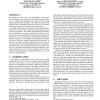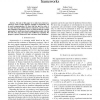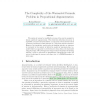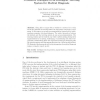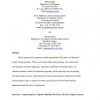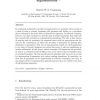140
Voted
ICAIL
2009
ACM
15 years 9 days ago
2009
ACM
In this paper we discuss how recent developments in argumentation frameworks, most notably Extended Argumentation Frameworks, can inform the representation of a body of case law u...
149
click to vote
ICTAI
2010
IEEE
15 years 14 days ago
2010
IEEE
The aim of this paper is to study how preferences, which are used to model intrinsic strengths of arguments, can be used in argumentation. We show that they play two roles: i) to r...
LOGCOM
2010
15 years 29 days ago
2010
The notion of warrant or justification is one of the central concepts in formal models of argumentation. The dialectical definition of warrant is expressed in terms of recursive...
109
Voted
JAPLL
2010
15 years 1 months ago
2010
In this paper, several examples from the literature, and one central new one, are used as case studies of texts of discourse containing an argumentation scheme that has now been w...
154
Voted
ITS
2010
Springer
15 years 1 months ago
2010
Springer
Being able to argue with a student to convince her or him about the rationale of tutoring hints is an important component of pedagogy. In this paper we present an argumentation fra...
103
Voted
ECTEL
2010
Springer
15 years 1 months ago
2010
Springer
Argumentation is omnipresent in our lives and therefore an important skill to learn. While classic face-to-face argumentation and debate has advantages in helping people learn to a...
109
Voted
AIS
2005
Springer
15 years 2 months ago
2005
Springer
Recent proposals for computer-assisted argumentation have drawn on dialectical models of argumentation. When used to assist public policy planning, such systems also raise questio...
100
click to vote
JAPLL
2008
15 years 2 months ago
2008
In traditional mathematical models of argumentation an argument often consists of a chain of rules or reasons, beginning with premisses and leading to a conclusion that is endorse...
105
click to vote
CACM
2006
15 years 2 months ago
2006
Electronic argumentation support is increasingly important in today's networked society. Virtual research collaboration, e-business, and many other domains of professional li...
110
click to vote
AIL
2006
15 years 2 months ago
2006
Governments and other groups interested in the views of citizens require the means to present justifications of proposed actions, and the means to solicit public opinion concerning...
